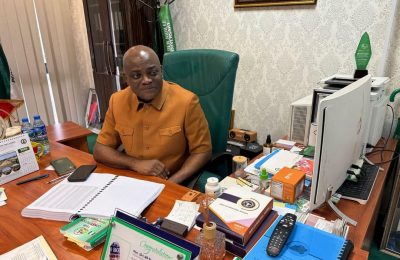At the heart of global climate negotiations at COP29 in Baku, Azerbaijan, the Nigeria Labour Congress (NLC) made a bold stand. Championing workers’ rights, advocating for a $5 trillion climate finance fund for the Global South, and pushing for a just transition. In this interview with CHRISTIAN APPOLOS, Comrade Echezona Asuzu, National Coordinator of NLC’s Climate Change Program, details the Congress’ strategy to protect workers, and demand climate justice at both national and international levels.
Ensuring workers’ interests in global climate policy: what’s the NLC’s strategy?

The NLC has been a leading voice on climate justice since 2009, recognising that climate change is not just an environmental issue, it’s a workplace crisis. The industries that fuel the climate crisis also employ millions of workers, making them the first victims of job losses, economic instability, and hazardous working conditions.
To address this, the NLC has been in the business of mobilizing workers across all sectors, gathering insights on how climate change impacts them. These perspectives shape our advocacy at the global stage, ensuring that workers’ realities are integrated into climate policies.
At COP29, we demanded that workers should be given a chair at the negotiation table. Climate change policies cannot be designed without the people most affected. “Nothing for us without us.”
By leveraging social dialogue, social protection mechanisms, and the Decent Work Agenda, we are ensuring that the transition to a green economy prioritizes workers’ rights, decent wages, and job security. The just transition movement originated from the global workforce. It’s our initiative, and we must drive its implementation.
With industries shifting to green jobs, How will workers be protected?
The green transition is irreversible. Science has shown that global warming, if left unchecked, will have catastrophic consequences. However, the transition must not exacerbate existing inequalities.
In the NLC, we are insisting that reskilling and upskilling are the best way to go.
Workers in traditional industries like oil and gas must be trained for emerging green jobs such as hydrogen energy, Compressed Natural Gas (CNG), biofuels, and sustainable aviation fuels. Nigeria has adopted gas as a transition fuel, but how many workers are equipped to handle CNG installations or repairs? We need massive workforce training.
We are also saying that Social Protection is sacrosanct to protecting workers. Truth is that not every worker will transition. Those who lose jobs must have access to pension reforms, job loss allowances, and financial safety nets. The government must follow the ILO guidelines on just transition, ensuring workers do not bear the brunt of the shift to green energy. Education reform is another pathway to protect workers. We are calling for our academic curriculum to reflect the reality of green jobs. Training institutions like the Industrial Training Fund (ITF) and the National Directorate of Employment (NDE) should be empowered to produce a workforce that fits into the green economy. The NDE especially, must be given the needed support to transit from most of its skill sets that are not in tune with the current skills of the digital economy. The government must invest heavily in these areas to prevent economic shocks and widespread unemployment. Our findings have revealed that these are some of the ways to protect not just workers but the economy as the issue of climate change rages.
What were the NLC’s key demands at COP29?
At COP29, the NLC made several critical demands. That workers must be at the negotiation table, led our demand. Climate policies must be designed with workers representation in national and global climate discussions. Workers’ voices should be mainstreamed, and labor organizations must be part of climate councils and decision-making bodies.
Another leading demand of NLC was $5 trillion Climate Finance for the Global South. The developed nations whose industrial activities caused the climate crisis—must pay. This finance must be in the form of grants, not loans, to avoid burdening developing economies with more debt. Social Protection for Workers was also another key demand. Countries must implement financial and legal safeguards for workers displaced by green transitions. Fair and Transparent Climate Funding also was major. The transition should not be driven by private profit motives. Public funds should be used to ensure equitable distribution of climate finance.
This year’s COP theme centered around climate finance, and we pushed and we are still pushing for a financing structure that truly supports vulnerable economies, rather than trapping them in financial dependency.
How is the NLC influencing Nigeria’s climate change policies?
The NLC is working to reform policies that ensure Sustainable Industrial Practices. Employers must upgrade production processes to minimize waste and environmental impact. Demand for Fair Wages and Shared Prosperity. In NLC our belief is that economic growth must benefit workers, not just corporate profits. Therefore we consider this as essentially vital to a sustainable just transition regime. In the same vein, Circular Economy is also crucial. We must reduce overproduction, overconsumption, and environmental degradation.
Workers’ welfare cannot be sacrificed for corporate gains. The environment is not just a resource—it’s the foundation of human survival. Our policies must reflect that reality.
How are global unions collaborating for climate justice action?
At COP29, the NLC built alliances with global trade unions, civil society organisations, and progressive movements. We participated in the People’s Plenary, a global coalition demanding that greed must not kill the planet.
We are also engaging with employers’ organizations, the Nigerian government, and the National Council on Climate Change, advocating for worker representation in decision-making bodies. Employers must understand that a sustainable business model benefits both the economy and the environment.
The fight for climate justice is a collective one. We are making sure that workers are not just part of the conversation but are leading it.
How effectively is the Nigerian government addressing climate change, and what strategic measures should be prioritized to enhance its response given the current realities?
Nigeria’s government has made some efforts to tackle climate change, but significant challenges remain. Policies such as the Nigeria Climate Change Act 2021, the Energy Transition Plan, and afforestation initiatives show commitment. However, implementation gaps, reliance on fossil fuels, weak enforcement of environmental regulations, and inadequate funding hinder progress. Climate-related disasters, including flooding, desertification, and coastal erosion, continue to threaten livelihoods.
The way forward is through strengthening climate governance. The government should fully operationalize the National Climate Change Council (NCCC) to ensure effective policy implementation, coordination, and accountability. A multi-stakeholder approach involving civil society and the private sector will improve outcomes. Following this is Enhance Climate Financing. Nigeria needs increased domestic and international financing for climate adaptation and mitigation.
The government should incentivize green investments, implement a carbon tax, and access more climate funds like the Green Climate Fund. Another one is serious investment in Renewable Energy. Reducing dependence on fossil fuels requires large-scale investment in solar, wind, and hydropower. Expanding decentralized renewable energy solutions will improve energy access while reducing emissions.
Promotion of Climate-Resilient Agriculture is also very important. Supporting farmers with climate-smart agricultural practices, improved irrigation systems, and access to drought-resistant crops will boost food security amid changing weather patterns. Enforcing Environmental Regulations is also very essential. Stronger enforcement against deforestation, gas flaring, and illegal mining is necessary.
The government should support reforestation efforts and introduce stricter penalties for environmental violations. Improve Public Awareness and Inclusion is also there. Climate education should be integrated into school curricula, and community-based adaptation strategies should be promoted, especially among vulnerable populations.
By addressing these areas, Nigeria can better mitigate climate risks and ensure sustainable development in the face of climate change.
READ ALSO: COP29 disappointments: African trade unions vow to push for just transition







